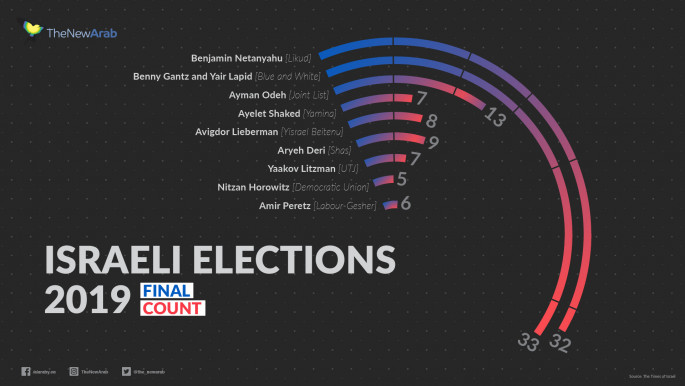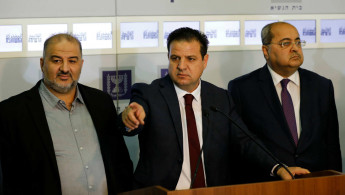Netanyahu trying to 'spark a civil war' in Israel, says Palestinian Joint List leader Odeh
Odeh's comments followed a Likud party "emergency" conference held by Netanyahu on Sunday in which the incumbent premier said the establishment of a minority government with Palestinian politicians would be an "attack on the State of Israel".
"Netanyahu's speech was not the beginning of a campaign," Odeh tweeted. "It was an attempt to spark a civil war. There has never been a prime minister who thrived so much on division, hatred and racism."
"The more Jews and Arabs hate each other - the more he benefits," the lawmaker added.
Odeh appealed to both the Palestinian and Jewish sections of Israeli society. To his fellow Palestinians, he said: "We will not bow our heads low! We will stand strong and united in the face of these attacks."
"I turn to you, the Jewish public," Odeh added, saying: "Who can better understand the danger of charismatic leaders who ride the dark waves of hate and racism? Who but you can truly understand what it's like to be a oppressed minority."
|
The statement comes as Netanyahu amps up his rhetoric against the Joint List and his rival Benny Gantz, who was tasked with forming a government after Netanyahu failed to do so.
The Joint List could play a key role in coalition formation with 13 seats in the Knesset, making them the third-largest force in the 120-seat legislature.
Netanyahu said ex-military chief Gantz was "conducting negotiations with MKs who support terror organisations and want to destroy the country," at the Sunday rally, according to Haaretz.
Read more: Israel's prime minister contender Gantz races to form government
"If a minority government like this is formed, they will celebrate in Tehran, Ramallah and Gaza, the way they celebrate after every terror attack," he added.
Odeh asked for police protection on Sunday following Netanyahu's statement, the Times of Israel reported, saying the divisive rhetoric endangered his life.
Gantz's Blue and White coalition issued a statement in response to the conference, saying: "The residents of the south didn't merit an 'emergency conference', nor have the patients strewn in the hospital hallways, the elderly or the disabled. As usual, Netanyahu is concerned only with Netanyahu."
The conference, which was reportedly attended by only a few hundred party activists, was described as a "circus" to Haaretz by a right-wing Israeli politician.
'Slap in the face'
Prime Minister Netanyahu said last week that a minority government created with the support of Palestinian parliamentarians would be a slap in the face of Israeli soldiers, Haaretz reported.
Netanyahu, who is fighting to secure his premiership for a fifth term, said "there is one government that should not be formed - and this is a minority government that supports and depends on the Arab parties".
Israeli politics has suffered from a deadlock since a 17 September election in which both Netanyahu's Likud Party and Gantz's Blue and White failed to secure enough seats to easily form a coalition.
 |
"I ask you Benny Gantz, do you want to form a government with these people? This is a direct slap in the face of IDF soldiers, the fighters you and I sent to battle," Netanyahu said at a conference speech last week.
Palestinian members of Israel's Knesset announced they were backing ex-military chief Gantz as the country's next prime minister following the election.
The endorsement by the mainly Arab Joint List alliance, which is the Knesset's third largest party, was the first time since 1992 that majority Palestinian parties have endorsed a candidate for prime minister.
Joint List leader Ayman Odeh told Israeli President Reuven Rivlin the alliance's priority was to oust Prime Minister Netanyahu from power, and was therefore recommending Gantz.
The Joint List coalition is made up of four major Palestinian-Israeli parties. There are major ideological differences between them – the list includes the left-wing Hadash group and the Arab nationalist National Democratic Assembly (Balad).
Palestinian Israelis are descendants of Palestinians who remained on their land in 1948, when Jewish-Israeli militias expelled the vast majority of Palestinians from what would became Israel.
They make up some 20 percent of the country's population.
Agencies contributed to this report.
Follow us on Twitter and Instagram to stay connected





 Follow the Middle East's top stories in English at The New Arab on Google News
Follow the Middle East's top stories in English at The New Arab on Google News
![Israeli forces ordered bombed Gaza's Jabalia, ordering residents to leave [Getty]](/sites/default/files/styles/image_330x185/public/2176418030.jpeg?h=a5f2f23a&itok=_YGZaP1z)

